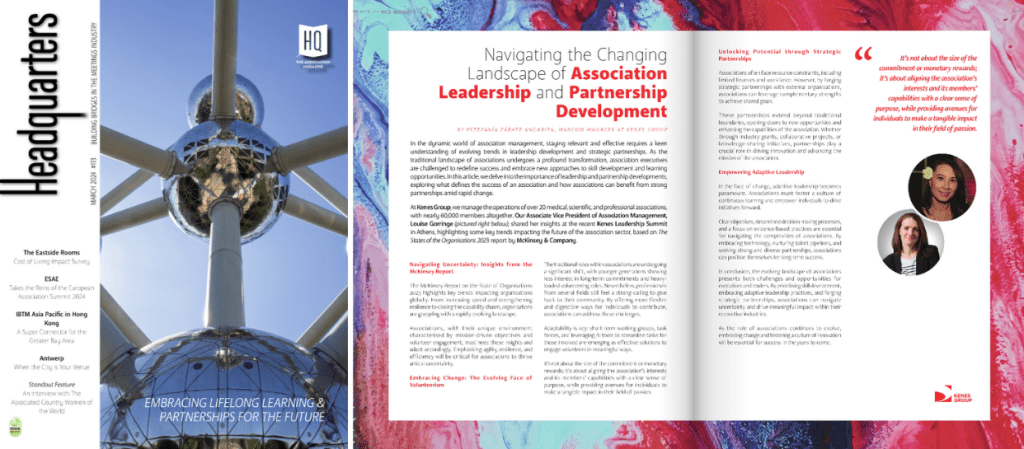
In the dynamic world of association management, staying relevant and effective requires a keen understanding of evolving trends in leadership development and strategic partnerships. As the traditional landscape of associations undergoes a profound transformation, association executives are challenged to redefine success and embrace new approaches to skill development and learning opportunities. In this article, we delve into the importance of leadership and partnership developments, exploring what defines the success of an association and how associations can benefit from strong partnerships amid rapid change.
At Kenes Group, we manage the operations of over 20 medical, scientific, and professional associations, with nearly 60,000 members altogether. Our Associate Vice President of Association Management, Louise Gorringe shared her insights at the recent Kenes Leadership Summit in Athens, highlighting some key trends impacting the future of the association sector, based on The States of the Organisations 2023 report by McKinsey & Company.
Navigating Uncertainty: Insights from the McKinsey Report
The McKinsey Report on the State of Organisations 2023 highlights key trends impacting organisations globally. From increasing speed and strengthening resilience to closing the capability chasm, organisations are grappling with a rapidly evolving landscape.
Associations, with their unique environment characterised by mission-driven objectives and volunteer engagement, must heed these insights and adapt accordingly. Emphasising agility, resilience, and efficiency will be critical for associations to thrive amidst uncertainty.
Embracing Change: The Evolving Face of Volunteerism
The traditional roles within associations are undergoing a significant shift, with younger generations showing less interest in long-term commitments and heavy-loaded volunteering roles. Nevertheless, professionals from several fields still feel a strong calling to give back to their community. By offering more flexible and digestible ways for individuals to contribute, associations can address these challenges.
Adaptability is key: short-term working groups, task forces, and leveraging AI tools to streamline tasks for those involved are emerging as effective solutions to engage volunteers in meaningful ways.
It’s not about the size of the commitment or monetary rewards; it’s about aligning the association’s interests and its members’ capabilities with a clear sense of purpose, while providing avenues for individuals to make a tangible impact in their field of passion.
Unlocking Potential through Strategic Partnerships
Associations often face resource constraints, including limited finances and workforce. However, by forging strategic partnerships with external organisations, associations can leverage complementary strengths to achieve shared goals.
These partnerships extend beyond traditional boundaries, opening doors to new opportunities and enhancing the capabilities of the association. Whether through industry grants, collaborative projects, or knowledge-sharing initiatives, partnerships play a crucial role in driving innovation and advancing the mission of the association.
Empowering Adaptive Leadership
In the face of change, adaptive leadership becomes paramount. Associations must foster a culture of continuous learning and empower individuals to drive initiatives forward.
Clear objectives, streamlined decision-making processes, and a focus on evidence-based practices are essential for navigating the complexities of associations. By embracing technology, nurturing talent pipelines, and seeking strong and diverse partnerships, associations can position themselves for long-term success.
Conclusion
In conclusion, the evolving landscape of associations presents both challenges and opportunities for executives and leaders. By prioritising skill development, embracing adaptive leadership practices, and forging strategic partnerships, associations can navigate uncertainty and drive meaningful impact within their respective industries.
As the role of associations continues to evolve, embracing change and fostering a culture of innovation will be essential for success in the years to come.
By
Estefanía Zárate Angarita
Kenes Group Media & Communications Manager
This article was originally published by Meeting Media Group – HQ #113 / Embracing Lifelong Learning & Partnerships for the Future, March 2024 (pg. 46 – 47): https://bit.ly/3TvaXKF